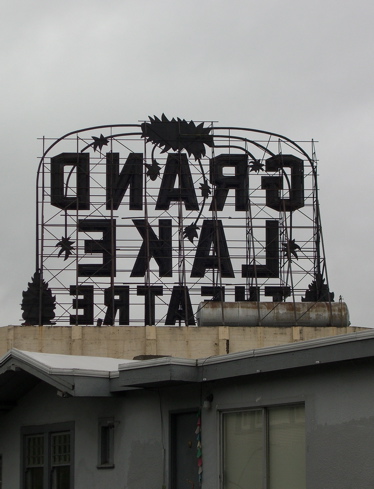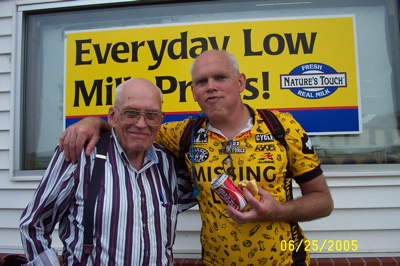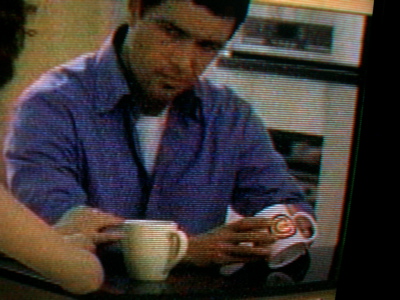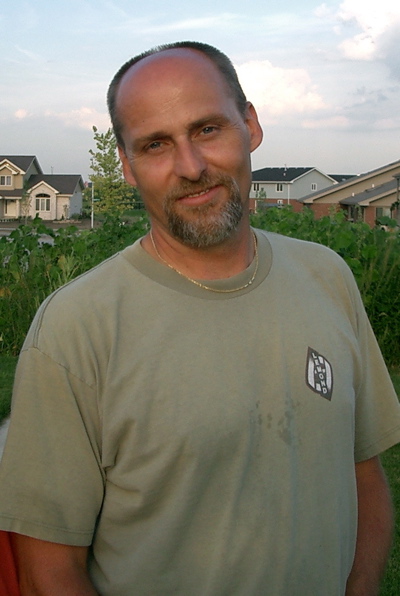So, I’ve been noodling postlessly over what to say about the issue of the week, the whole immigration debate. Monday, there was the Day Without an Immigrant, as KTVU News anchor Leslie Griffith called it. And today, we have Cinco de Mayo, an important day for that immigrant we went without on Monday.
There was this, too: Last weekend, while licking my wounds from my audacious 206 miles of riding the Bay Area’s highest peaks — the Devil Mount Double — I got an email from a woman in Chicago who turns out to be a third cousin on my mom’s side of the family. Our common ancestors are John and Bridget Moran, my great-grandmother’s parents, who left Clare Island, County Mayo, Ireland, in 1887 and wound up in the Back of the Yards in Chicago. Thinking about them, thinking about all the other people who had to set out during the middle and late 19th century from Ireland and Norway to assemble the pieces of what I know as my family, made me think about how connected we are, nearly all of us, to the immigration question today.
One thing led to another after I received that genealogy email, and I wound up tracking down and looking at the 1900 census records that include the Morans and also the family of their daughter Anne and the man she married, Martin O’Malley. All were new arrivals with big families. The census records contain scant information on individuals, but just enough to give you a hint about their lives. Martin, in 1900 the father of eight living children, was listed as “labor at yards.” So were his two oldest sons, living at home in their late 20s.
Going up and down the rather haphazard roster of households on West 47th Street, where the census lists the O’Malleys, and on West 47th Place, where the Morans lived, and on all the other streets nearby, you see immigrant families, most from Ireland, packed into block after block of row houses on postage-stamp lots, their “occupation, trade or profession” listed as labor at yards, farm labor, “labor at pickle factory,” teamsters, butcher’s clerks, barbers, domestics, “commission men” (which I take to be “salesmen”), cattle butchers, hog butchers, sheep butchers, meat weighers, railroad clerks, railroad swtichmen, dressmakers, shoemakers, saloonkeepers, storekeepers, housekeepers, night watchmen, telephone operators and telephone girls, messengers and messenger boys.
These weren’t rich people. They weren’t middle-class people. They weren’t warmly welcomed or well-loved by people who had been in the country longer and could afford to live in better circumstances. They were foreigners throwing their back into the work of gaining a toehold and seeing what they could do once they’d gained a purchase on this new place.
And, yes, let me be sure to say that they were legal immigrants who followed the rules when they came into the country. Let’s say that,and in the next breath acknowledge how little that really means, because in truth U.S. laws on immigration have had little to do with maintaining a neat and orderly society and much to do with exercising whatever racial and economic fear happened to be prevalent at a given moment.
For immigrants from northern and western Europe, the hardest part of the trip, practically speaking, was making it and paying for it. For those who arrived before the 1880s, once you showed up in New York or Boston or wherever you landed, you were in. Your name would be recorded somewhere, sure, but it was not as if you had passed a test of personal or civic virtue to be admitted to the United States. Starting in the 1880s, we — we meaning Congress — started to get more particular about who would be let in and who wouldn’t. For immigrants from Europe — let’s translate and say white folks, even if they didn’t speak English — a head tax was imposed (50 cents an immigrant) and some conditions were placed on admission. Unwanted: criminals, the insane, the depraved, the diseased.
That was the kind face of the new immigrations laws. The laws’ more purposeful side applied not to the millions coming from Europe, but to those from China, Japan, the Philiippines, India and other non-Caucasian places. Simply speaking, after decades of letting Chinese and other Asians into the West (mostly) to mine and build railroads and drain swamps, Congress decided we had more than enough cheap labor on hand and we could afford to make it practically impossible for Asians to get into the country.
To jump ahead to where we are today, with the House already having voted to make it a felony to illegally cross the U.S. border or to offer any aid to someone in the country without the required paperwork: One’s tempted to ask, “So what’s new?” Whenever the country has tightened its immigration laws, two factors are always present: Some target group or groups whose race, language or culture is pointed to as alien by the well-assimilated and forgetful majority (what do you mean Grandma didn’t speak English?); and some concern over what the flood of hungry, energetic, and willing-to-work-for-anything newcomers are doing to the job market.
So today, we’re pretty much back to where we were when we decided we didn’t want any more Chinese or Japanese or so many Italians, Poles and Russians. We’re not in the middle of a big winning streak for rational, well-tempered, or generous action. But action’s going to be taken — we have tangible and intangible things that people everywhere seek, and they won’t stop coming to try to find them here. Our decision might be a little less painful to look back on if our discussion could start with the awareness that when our people got here, they all looked just like the immigrants we see around us now.
Technorati Tags: chicago, immigration




